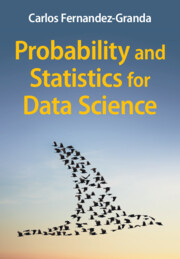Book contents
- Frontmatter
- Dedication
- Contents
- Preface
- Book Website
- Introduction and Overview
- 1 Probability
- 2 Discrete Variables
- 3 Continuous Variables
- 4 Multiple Discrete Variables
- 5 Multiple Continuous Variables
- 6 Discrete and Continuous Variables
- 7 Averaging
- 8 Correlation
- 9 Estimation of Population Parameters
- 10 Hypothesis Testing
- 11 Principal Component Analysis and Low-Rank Models
- 12 Regression and Classification
- Appendix Datasets
- References
- Index
12 - Regression and Classification
Published online by Cambridge University Press: 19 June 2025
- Frontmatter
- Dedication
- Contents
- Preface
- Book Website
- Introduction and Overview
- 1 Probability
- 2 Discrete Variables
- 3 Continuous Variables
- 4 Multiple Discrete Variables
- 5 Multiple Continuous Variables
- 6 Discrete and Continuous Variables
- 7 Averaging
- 8 Correlation
- 9 Estimation of Population Parameters
- 10 Hypothesis Testing
- 11 Principal Component Analysis and Low-Rank Models
- 12 Regression and Classification
- Appendix Datasets
- References
- Index
Summary
This chapter covers regression and classification, where the goal is to estimate a quantity of interest (the response) from observed features. In regression, the response is a numerical variable. In classification, it belongs to a finite set of predetermined classes. We begin with a comprehensive description of linear regression and discuss how to leverage it to perform causal inference. Then, we explain under what conditions linear models tend to overfit or to generalize robustly to held-out data. Motivated by the threat of overfitting, we introduce regularization and ridge regression, and discuss sparse regression, where the goal is to fit a linear model that only depends on a small subset of the available features. Then, we introduce two popular linear models for binary and multiclass classification: Logistic and softmax regression. At this point, we turn our attention to nonlinear models. First, we present regression and classification trees and explain how to combine them via bagging, random forests, and boosting. Second, we explain how to train neural networks to perform regression and classification. Finally, we discuss how to evaluate classification models.
Keywords
Information
- Type
- Chapter
- Information
- Probability and Statistics for Data Science , pp. 495 - 598Publisher: Cambridge University PressPrint publication year: 2025
